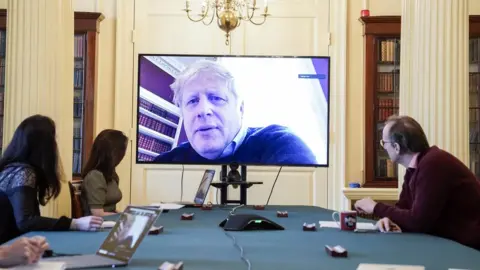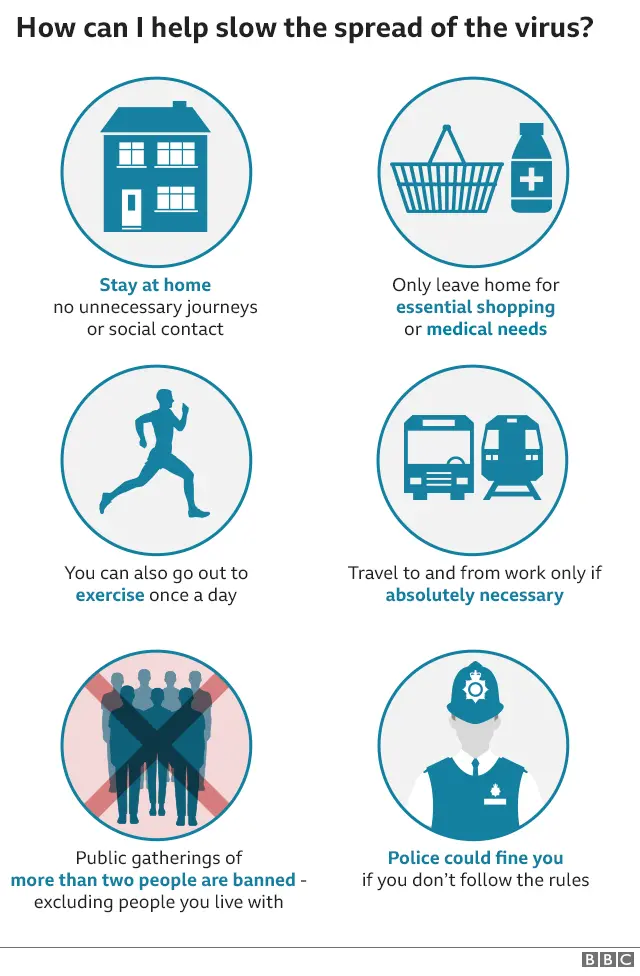Coronavirus: Things will get worse before getting better, PM warns
 PA Media
PA MediaThe prime minister has warned that the coronavirus crisis will get worse before it gets better, in a letter being sent to every UK household.
Boris Johnson, who is self-isolating after testing positive for Covid-19, says stricter restrictions could be put in place if necessary.
Britons will also get a leaflet detailing government rules on leaving the house and health information.
It follows criticism over the clarity of government advice to date.
The number of people who have died with coronavirus in the UK has now reached 1,019, with a further 260 deaths announced on Saturday.
There are now 17,089 confirmed cases in the UK.
In the letter being sent to 30 million households at an anticipated cost of £5.8m, Mr Johnson writes: "From the start, we have sought to put in the right measures at the right time.
"We will not hesitate to go further if that is what the scientific and medical advice tells us we must do."
Tough measures to tackle the spread of coronavirus, including a ban on public gatherings of more than two people and the closure of shops selling non-essential goods, were introduced last week.

- LIVE: Latest updates on the crisis
- A SIMPLE GUIDE: How do I protect myself?
- AVOIDING CONTACT: The rules on self-isolation and exercise
- LOOK-UP TOOL: Check cases in your area
- MAPS AND CHARTS: Visual guide to the outbreak
- STRESS: How to look after your mental health

"It's important for me to level with you - we know things will get worse before they get better," the letter reads.
"But we are making the right preparations, and the more we all follow the rules, the fewer lives will be lost and the sooner life can return to normal."
Experts have said they expect the number of coronavirus cases and deaths to continue to rise for the next two to three weeks, before the effects of social distancing measures and restrictions on everyday life begin to have an impact.
Responding to reports current measures could be in place until June, Scotland's chief medical officer Catherine Calderwood told BBC Radio 4's Broadcasting House: "The modelling that's been done, and that I have seen, has always said that we need at least 13 weeks of some sort of measures in order to really get this virus away from spreading amongst people.
"When you have a shorter period of time, as I understand other countries have done, as soon as you lift the measures the virus comes back again because you haven't stopped it transmitting amongst lots of people."
Cabinet Office minister Michael Gove declined to say how long the restrictions might last but said everyone "has to prepare for a significant period where these measures are still in place".
"I wish I could predict when this will end," he said. The date of the peak of the virus "depends on all of our behaviour", he added, saying: "It's not a fixed point".
In his letter, Mr Johnson describes the pandemic as a "moment of national emergency", and reiterates the government guidance to stay at home to avoid putting pressure on the NHS, so that lives can be saved.
The prime minister acknowledges the restrictions will have a financial impact on families.
However, writing after ministers unveiled billions of pounds of help for workers and businesses, he says: "The government will do whatever it takes to help you make ends meet and put food on the table."
Mr Johnson also praises the work of doctors, nurses and other carers as well as well as the hundreds of thousands of people who have volunteered to help the most vulnerable.
The leaflet sent alongside the letter includes guidance on hand-washing, an explanation of coronavirus symptoms, the government rules on leaving the house and advice on shielding vulnerable people.
Allow X content?

Meanwhile, new powers, including fines of up to £5,000, to enforce guidelines on people staying at home and businesses staying closed came into force in Northern Ireland on Saturday evening.
The maximum fine will be reserved for businesses but individuals could face a fine of up to £960 if they do not comply.
In England and Wales, people ignoring restrictions could be hit with a £60 fine initially and another £120 for a second offence. Fines in England will rise to a maximum of £960 for repeat offences.
It comes as former Prime Minister Tony Blair suggested "mass testing" was needed to avoid another surge of virus cases when restrictions are finally eased, telling Sky News's Sophy Ridge on Sunday: "You need a very clear understanding of who has got it and who hasn't."
Health Secretary Matt Hancock said the government was now testing 10,000 people a day, and was "on track" to test 25,000 by mid-April. Testing has also been ramped up for frontline hospital staff to see if they have the virus.
In other developments:
- The first of three flights chartered by the Foreign Office to bring home British tourists stranded in Peru will leave the capital Lima on Sunday
- The Duke and Duchess of Cambridge are supporting a Public Health England initiative giving people tips on looking after their mental health during the pandemic as the government provides an additional £5m funding to charities to expand their services
- More than 750 St John Ambulance volunteers have offered to help at the temporary hospital set up in London's Excel centre to meet demand for intensive care beds
- Food parcels have begun to be delivered to the most vulnerable people in England who are being told to stay at home for the next three months to protect them from coronavirus
- Secretary of State for Scotland, Alister Jack, is self-isolating after he developed coronavirus symptoms. He is said to be experiencing mild symptoms but has not been tested for Covid-19
- Home Secretary Priti Patel has pledged to protect victims of domestic abuse, who she says are particularly at risk during the pandemic because of the need to stay at home
- The Mayor of Greater Manchester, Andy Burnham, said he had received about 300 complaints from employees and the public about businesses not following social distancing guidelines
- The Foreign Office said it was working "around the clock" to support British travellers stranded in India amid a government lockdown

As well as the prime minister, Health Secretary Matt Hancock is also self-isolating after testing positive for the virus. The UK's chief medical officer, Prof Chris Whitty, is also self-isolating, but has not tested positive.

